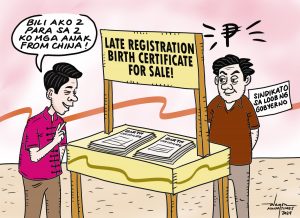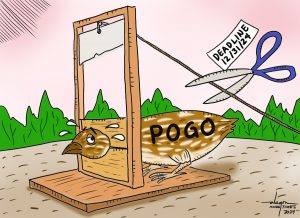Where is Ret. P/Col. Dionisio Abude, our idol in community relations work? For the last few days we have been reading news on the activities of the City Transport and Traffic Management Office (CTTMO) concerns quoting Eduardo Perez, the acting head of the said agency of the Davao City local government.
Has P/Colonel Abude retired? Or, is he “being retired” or eased out from the office? We have not heard any word from him nor from City Hall as to his status. We hope his sudden “disappearance” from the scene is not about health issues, more so about offshoot of office intrigues.
Anyhow, Acting CTTMO chief Perez appears to be starting his stint with some worthy issues for consideration by the local government policy-making body. The latest we read and heard of him in the news is his raising concerns about the operation of e-trikes on city roads.
According to Perez there is still no regulating body or ordinance governing the operation of e-trikes in the city. Its operation is outside the ambit of the Ordinance Regulating the Operation of Bicycles that now provides for lanes of 2-wheel pedal driven vehicle. The same ordinance also designates the roads in Davao City where bicycles are allowed to use.
Under the City Traffic Code only pedal-operated tricycles (Sikads) are recognized, the acting CTTMO chief claimed during a recent press forum.
We believe that this assertion by Perez should immediately be looked into by our city councilors. With the claim of Ms. Chona Advincula, CTTMO head of Motor Vehicle Franchising and Regulatory Division that over 200 e-trikes in various parts of the city since 2022 have been apprehended all the more that regulating its operation is of utmost importance. What with most of the apprehended e-trikes drivers were minors.
Now the councilors have something to work on.
*****************************
SSS net income soars to P83 billion in 2023 – news report.
The amount is staggeringly gargantuan. This net income of course came from the returns of SSS’s various investments. Without doubt the money the agency invested in stocks of corporations that are into various industries including banking, came from the contributions of worker-members and the counterpart of their employers.
Even if the country’s pension agency for private sector employees will claim the P83 billion net income includes the ROIs re-invested, still these are derived from the members’ and their employers’ money.
But why is the SSS still demanding for an increase in premium contribution? If it is true that the money available for pension payments of retirees is likely to be up to, say, ten years’ time, then why not chip some from the humongous net income of P83 billion?
********************************
We wish to congratulate Councilor Tek Ocampo for the initiative taken by his office to undertake blood-letting activities to help augment the stock of the Philippine National Red Cross for the life-saving liquid – blood. With the number of blood bags (normally at 450 cc contents each bag) gathered, several lives will likely be saved from sure death.
But many Davaoenos will likely appreciate it more if Councilor Tek will be able to bring his initiative to the next level. That is, to come up with local legislation that will institutionalize blood typing in the communities with blood-letting as an aside.
It is common knowledge that Davaoenos, especially those coming from the rural barangays are confronted with problems of securing blood each time they have relatives brought to the hospital and required to have blood infusion. Even if they have the money to pay for whatever fees required for the acquisition of blood, if the type needed is not available, then their next problem is to look for persons that they can bring to the hospital for blood transfusion or to the blood bank for type determination and extraction. (Note: blood is for free; what is collected is some kind of reimbursement to the cost of chemicals needed to preserve the blood and the cost of certain gadgets needed to draw out the blood). More often the persons they found put a tag price on their blood plus add-on cost of “recovery”. There are chances that the supposed donor’s blood type does not match with that of the patient. So they have to look for other potential donors again.
So, if blood-typing can be done as a mandated activity in each barangay, the rural health centers will have a record of who among the residents in the village have the same type as that of the patient from their village needing blood infusion. Therefore, if the blood type of patients is not readily available, then the relatives or immediate family members can easily go back to their barangay and ask for the persons having the same blood type.
Meanwhile, while doing the blood-typing the health workers may convince residents to donate blood by citing the benefits their generous act could bring to them, their families, and other co-villagers when time comes.
Or, if there is any legal impediment for the crafting of such ordinance, then a closely related local legislation mandating every resident in the barangay to register his or her blood type in the health center can be a good substitute. This will give constituents easy reference should there be a need from any of them.
How about that Councilor Tek?


